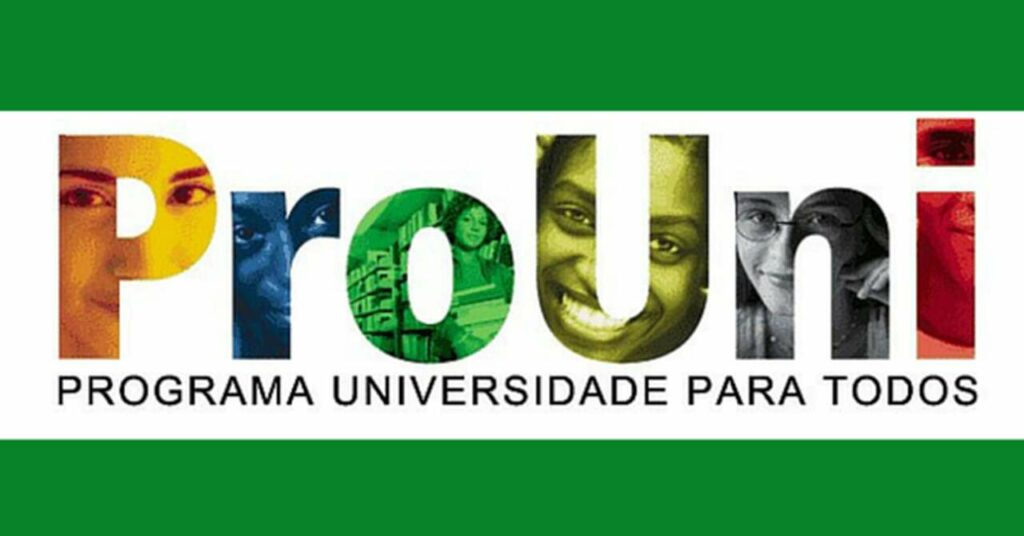O University for All Program (Prouni) is an initiative of the Brazilian federal government that aims to increase access to higher education for low-income students.
Since its creation in 2004, the Prouni has been an essential tool for democratizing access to quality education, offering full and partial scholarships at private higher education institutions.
How Prouni works

Program that helps you
Get into college with up to 100% scholarship.
*You will remain on the current site
Eligibility Criteria
To apply for Prouni, students must meet certain criteria. They must have taken part in the most recent National High School Exam (ENEM) and obtained a minimum average of 450 points in the tests, as well as not having failed the essay. In addition, applicants must meet the following income criteria:
- Full scholarshipsFor students with a gross monthly per capita family income of up to 1.5 minimum wages.
- 50% partial scholarshipsFor students with a gross monthly per capita family income of up to 3 minimum wages.
In addition to the income criteria, Prouni is also aimed at teachers from the public school system, who are effectively teaching in basic education and are part of the permanent staff of the public institution. In this case, there is no requirement to prove income.
Registration and Selection
Applications for Prouni take place twice a year, usually at the beginning of each academic semester. The application process is completely free and is carried out exclusively online, on the program's official website. During registration, candidates must choose up to two options of institution, course and shift from those available, according to their ENEM score.
Candidates are selected on the basis of their ENEM score, following the ranking order and the number of scholarships available for each course. The results are announced in successive calls, and pre-selected candidates must go to the institutions to prove the information provided during registration.
Prouni benefits
Access to Quality Higher Education
The main benefit of Prouni is the democratization of access to higher education. Many students who would not be able to afford the costs of a private university can, through the program, fulfill their dream of studying for a degree.
Social Inclusion
Prouni promotes social inclusion by enabling low-income students to enter higher education, helping to reduce social and economic inequalities in Brazil. In addition, the program encourages diversity in the academic environment, enriching learning and the exchange of experiences between students from different backgrounds.
Career opportunities
With a higher education diploma, Prouni beneficiaries have a better chance of entering the job market and obtaining positions with higher salaries. This reflects not only on the students' personal lives, but also on the country's economic and social development.
Prouni's impact on Brazilian education
Increase in the Number of Graduates
Since its implementation, Prouni has made a significant contribution to increasing the number of graduates in Brazil. Thousands of students have already benefited from the program, increasing the education rate and qualifying the workforce available on the market.
Strengthening Private Institutions
By offering scholarships at private institutions, Prouni also strengthens these institutions by ensuring that the available places are constantly filled. This contributes to the financial stability of these institutions and allows them to invest in improving their infrastructure and the quality of their teaching.
Incentives to Improve Secondary Education
Prouni also has an indirect effect on basic education, by encouraging high school students to dedicate themselves more to their studies in order to get a good mark in the ENEM and thus win a scholarship. In this way, the program contributes to improving the quality of secondary education in Brazil.
Challenges and future prospects
Financial sustainability
One of the challenges facing Prouni is the program's financial sustainability. Maintaining long-term funding for the scholarships requires a constant effort on the part of the government and efficient management of the available resources.
Program expansion
Another challenge is to expand the program to cater for even more students. The demand for scholarships is high, and many candidates who meet the eligibility criteria end up being left out due to a lack of places.
Improving Selection Criteria
Constant review and improvement of the selection criteria is also necessary to ensure that scholarships are allocated fairly and efficiently. This includes considering regional aspects and the particularities of each course and institution.
Conclusion
Prouni has proved to be a powerful tool for promoting social inclusion and democratizing access to higher education in Brazil. Despite the challenges, the program continues to transform lives and contribute to the country's educational and economic development. Investing in Prouni is investing in Brazil's future, providing opportunities for more young people to achieve their dreams and contribute to a fairer and more equal society.






